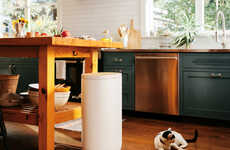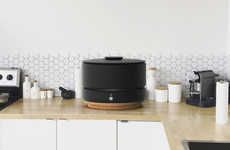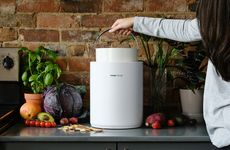
The 'Taihi Bin' Relies on a Japanese Method of Decomposition
Ellen Smith — July 24, 2017 — Eco
The 'Taihi' bin is an odor-free compost bin that's attempting to alter people's perceptions of waste recycling and reduction.
The device features a double-lidded system and relies on a Japanese method of fermenting to decompose waste, while eliminating the mess and smell. This system extracts the liquid from the waste, storing it into a separate compartment. When removed, this compartment can be used to instantly feed household plants. The double-lidded system, coupled with a set of rubber seals, ensures for an odor-free experience, while the non-stick coating aids in emptying and cleaning. The clear and minimal design of this project makes for an unobtrusive, but environmentally responsible kitchen accessory.
The process of making the less glamorous aspects of environmental responsibility seem appealing poses a challenge to designers, resulting in the conception of objects like the Taihi bin, which eliminates some of the messier elements.
The device features a double-lidded system and relies on a Japanese method of fermenting to decompose waste, while eliminating the mess and smell. This system extracts the liquid from the waste, storing it into a separate compartment. When removed, this compartment can be used to instantly feed household plants. The double-lidded system, coupled with a set of rubber seals, ensures for an odor-free experience, while the non-stick coating aids in emptying and cleaning. The clear and minimal design of this project makes for an unobtrusive, but environmentally responsible kitchen accessory.
The process of making the less glamorous aspects of environmental responsibility seem appealing poses a challenge to designers, resulting in the conception of objects like the Taihi bin, which eliminates some of the messier elements.
Trend Themes
1. Odor-free Composting - Design compost bins that don't produce unpleasant smells while decomposing waste
2. Fermentation-based Waste Management - Create waste management systems that ferment waste to break it down into compost without producing unpleasant odors
3. Environmentally-driven Home Accessories - Design household items that aim to reduce waste and encourage more eco-friendly behaviors
Industry Implications
1. Home Goods - Produce odor-free compost bins and other eco-friendly household items to cater to environmentally conscious consumers
2. Waste Management - Develop innovative waste management systems that utilize fermentation to reduce waste without producing bad odors
3. Kitchen Products - Create non-stick, minimalist and eco-friendly kitchen accessories for consumers who value sustainability
6.6
Score
Popularity
Activity
Freshness























